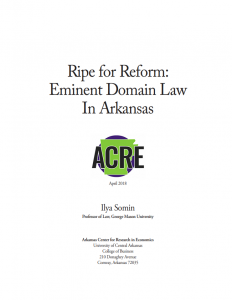Eminent Domain is the right of the government to take land for public use as long as it provides just compensation. Ripe for Reform: Eminent Domain Law In Arkansas is written by Ilya Somin, a Professor at George Mason University, and explores three aspects of Arkansas’s eminent domain laws. These three aspects are the standard for just compensation, the lack of clarity regarding what serves the general public, and how the definition of blight within blight condemnations is far too broad.
The standard of just compensation in Arkansas is defined as one that provides “fair market value.” Somin argues that Arkansas law may fail to take into account an owner’s “subjective value” of the property. An example of this is when land has been held by one family for generations. This family may place enormous value on this land for sentimental reasons, but Arkansas’s standard ignores this aspect of value.
Eminent domain power is also given to all pipeline companies that transport oil and natural gas throughout the state. This applies to public utility companies as well as purely private companies. According to Somin, statutory law does not make clear the extent to which eminent domain can be used to acquire land for purely private pipelines, which do not serve the general public but only selected private customers of the firm that operates them. Somin suggests Arkansas legislators consider reforms that limit the eminent domain powers of private pipelines.
Blight condemnations are also a problem in Arkansas. The definition of blight is so broad that “almost any feature that impedes development in some way can be characterized as an ‘economic or social liability’ or as detrimental to public welfare” and could be considered blighted, according to Somin. Essentially, almost any property could be considered for a blight condemnation. The greater a chance a plot of land, a house, or a neighborhood has to be condemned for blight, the less secure the property rights are and the less likely it is for people to invest in their property.
If you want to see more of our work on this topic, you can find our page here.

